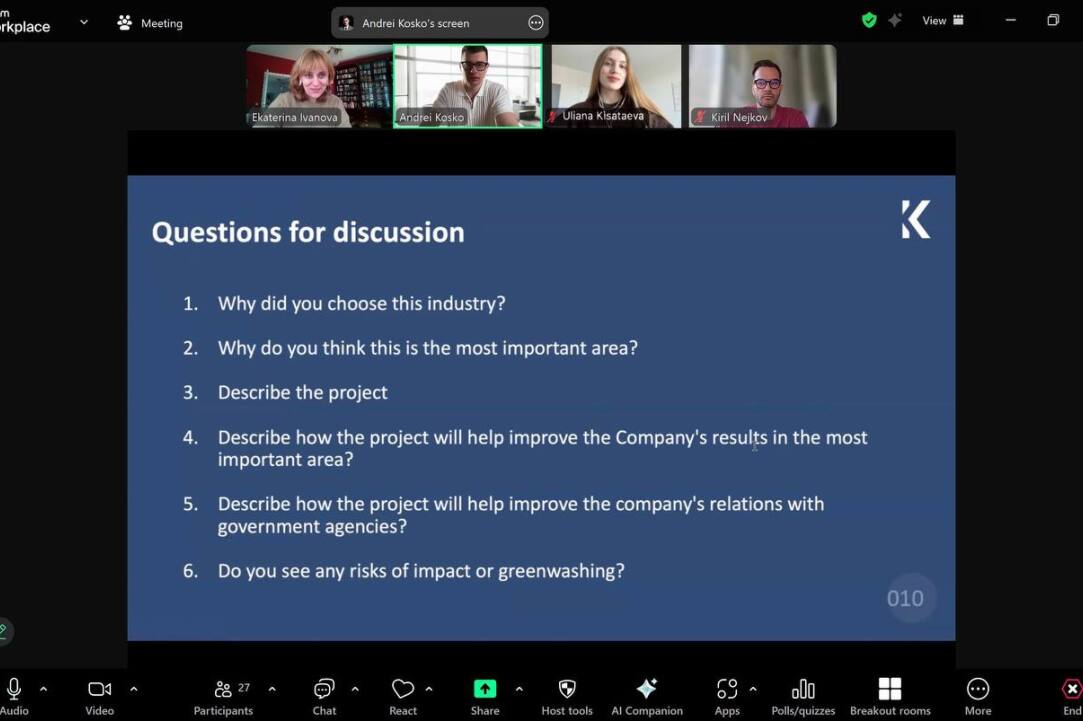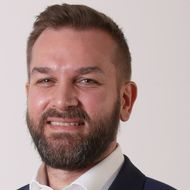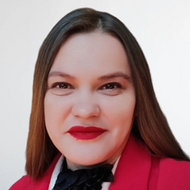Managing sustainability through the lens of business–government interaction

The course brought together a unique interdisciplinary group of master’s students from various faculties of HSE University, creating fertile ground for in-depth discussions on sustainable development. The course included students from many countries and academic backgrounds, including business disciplines — management, sustainable development economics, marketing, and business analytics — as well as the social sciences — sociology, political science, psychology — and from three HSE campuses in Moscow, St. Petersburg, and Nizhny Novgorod. This diverse group enabled a comprehensive analysis of real company cases selected by students for discussion with the lecturer, viewed from various professional perspectives.
During the guest lecture, Andrey Kosko presented an analysis of the application of the ESG approach in business, which over the past two decades has evolved from a risk management tool in three areas — environmental, social, and corporate governance — into a strategic instrument for achieving global sustainable development goals. As the speaker emphasized, modern companies increasingly view ESG not just as formal compliance with international standards and non-financial reporting, but as a foundation for the fundamental transformation of business models. The interactive lecture also addressed the importance of ESG not only for large corporations but also for small and medium-sized enterprises.
Key attention was given to environmental issues and the climate agenda, where Russia is currently forming a regulatory framework for a low-carbon transition. Fundamental documents were presented, such as the “Climate Doctrine of the Russian Federation,” the “Strategy for the Socio-Economic Development of the Russian Federation with Low Greenhouse Gas Emissions Until 2050,” and the Federal Law “On Limiting Greenhouse Gas Emissions.” These regulations provide strategic guidance for the development and implementation of state policy on low-carbon development, creating a foundation for coordinated action between government and business, especially in energy-intensive sectors of the economy.
Special focus during the guest lecture was placed on the interaction between business and government (Government Relations). It was noted that unlike lobbying, which targets specific legislative changes and short-term goals, GR involves a systemic dialogue between business and government agencies to form a stable regulatory environment in the long term. In Russian practice, where the state acts as both regulator and a key participant in ESG transformation through the ownership of strategic assets and development of sectoral initiatives, it is important for businesses not only to adapt to new requirements but also to actively participate in shaping the standards and principles of responsible commercial conduct.
In the interactive part of the lecture, students were divided into teams to analyze ESG approaches of leading Russian and international companies. Each team examined specific ESG initiatives, evaluating their impact on sustainable development.
While analyzing the case of Sber, students highlighted how the company is developing and implementing its own artificial intelligence, which also contributes to ESG transformation. They noted the development of multimodal neural networks that not only optimize financial decisions while considering environmental and social factors (such as labor market access for people with disabilities) but also create new tools for sustainable development. The company’s educational initiatives were also discussed, including programs for training AI specialists and scientific research focused on human–AI interaction. Students emphasized that such a comprehensive approach allows Sberbank not only to increase its efficiency but also to create technological solutions for the sustainable development of the entire financial ecosystem.
In the practical part of the lecture, special attention was given to the role of oil and gas companies in the global sustainability agenda. Students noted that this sector has a significant impact on both climate policy and the socio-economic development of the regions in which it operates. The team that studied Gazprom analyzed the company’s integrated approach to ensuring energy security and sustainable development in remote areas. Particular interest was shown in projects to create hybrid energy complexes that combine traditional gas solutions with renewable energy sources. Students noted that this approach not only reduces the carbon footprint but also ensures stable energy supply in Arctic regions with extreme climatic conditions.
In examining the case of Lukoil, participants focused on the company’s strategy for a gradual transition to a low-carbon economy. Initiatives for modernizing oil refining capacities, implementing best available technologies, and developing alternative energy solutions were explored in detail. The study of Shell’s case allowed for a comparison with international experience in energy transition. Students analyzed how the company adapts its global ESG strategy to regional contexts, developing both traditional gas businesses and renewable energy in different countries where it operates. Differences in the pace and priorities of decarbonization depending on local regulatory requirements and market conditions were noted.

Ekaterina Ivanova
Doctor of Social and Economic Sciences, Associate Professor at the Department of Strategic and International Management, HSE Graduate School of Business
“It’s always a pleasure to invite expert practitioners. I am extremely grateful to Andrey Kosko for engaging HSE students in discussions of real cases of ESG business transformation with a focus on understanding the roles of key stakeholders — from the state to individuals and nature. The interactive format was a success, and the three hours in the online format flew by — with great benefit for all participants! I am confident that we will continue this kind of collaboration with Russia’s leading GR consulting firm at GSB. And perhaps some of our students will find their path in sustainable development thanks to the hands-on experience they gained during the session.”

Andrey Kosko
Senior Consultant, Head of Kesarev Practice in Belarus
“The course on sustainable development was organized at a very high level. For me personally, this was evident in the way it integrated both purely academic (yet important) theoretical questions on sustainability and the practical aspects that GR professionals encounter. This kind of space allows students to find their own path and role in the world of sustainable development and to make an informed choice of profession or the expansion of their skillset — which, in my opinion, is what defines a quality business education. While participating as a lecturer, I repeatedly thought that, as a student, I would have wanted this kind of approach from an educational institution and professor. Many thanks to Ekaterina Ivanova for organizing the course and to all the students for their engagement!”

Ulyana Kisataeva
1st-year master’s student, “International Management” program, Moscow
“Instead of a traditional lecture, this session turned into a deep dive into the strategic, systemic, and political aspects of sustainability. We weren’t just listening — we were co-creating solutions. In teams, we analyzed the ESG strategies of companies like Sber, Lukoil, Gazprom, and Shell. Our team, in particular, explored how artificial intelligence can contribute to sustainable finance, combining technological innovation with social impact — a topic especially close to me due to my background in ethical marketing and engagement in sustainable business. For me, sustainable leadership isn’t just theory from textbooks. It requires the willingness to work with complex, interconnected systems and to stay true to values that lead to real change. I am grateful to Andrey Kosko for the deep insights and to Professor Ekaterina Ivanova for creating an open, practice-oriented environment that supports meaningful professional growth.”

Kirill Neykov
1st-year master’s student, “Compliance and Legal Risk Prevention” program
“The lecture was very well-structured and consisted of two parts: a) an overview of key concepts by the speaker and b) student group work — and both parts were thoroughly developed. The lecture’s interactive format, combining open discussion with practical work, gave it special value. The professor and guest speaker skillfully created a space for professional dialogue — they shared expert insights while encouraging a diversity of views and critical thinking. In the second part, during our group work, we were assigned a creative task analyzing real cases. It was an excellent session! Thank you for organizing it!”

Maria Repina
1st-year master’s student, “Applied Social Psychology” program
“The course ‘Corporate Sustainability Management in a Globalized World’ revealed that ESG is a complex ecosystem where the interests of multiple stakeholders intersect, and solutions require fine-tuning and a balance between economic efficiency, environmental responsibility, social justice, and ethics. We, the students, had the opportunity to see these contradictions and paths to resolve them through real cases of Russian and international companies. One of the most frequent comments during the course was: ‘This decision has a positive effect in one area, but we need to consider its impact on others, such as the environment.’ The value of the course lies in shaping a vision of how to build dialogue between different positions while remaining committed to long-term goals and contributing to a sustainable future — not just for one company, but for the entire community. Special thanks go to Professor Ekaterina Ivanova, whose professional path is an example of such systematic work, and to Andrey Kosko for his openness in discussing the contradictions of ESG transformation.”
The guest lecture, as an educational experiment, clearly demonstrated that preparing professionals in sustainable development requires overcoming traditional disciplinary boundaries through the synthesis of different approaches — including economic analysis, managerial perspectives, and socio-humanitarian knowledge. The practice-oriented format, with an invited expert and open student discussions analyzing real company decisions and their ESG impact, proved highly effective for such interdisciplinary engagement.
